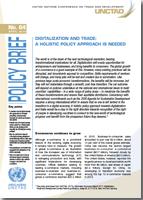
The world is at the dawn of the next technological revolution, bearing transformational implications for all. Digitalization will create opportunities for entrepreneurs and businesses, and bring benefits to consumers.
The global growth of e-commerce is a good example of this. However, many existing practices will be disrupted, and incumbents exposed to competition. Skills requirements of workers will change, and many jobs will be lost and created due to automation.
Like previous large-scale economic transformations, the benefits will be immense, but they will not materialize through a smooth, cost-free transition.
The net outcome will depend on policies undertaken at the national and international levels to build countries’ capabilities – in a wide range of policy areas – to maximize the benefits of these transformations and ensure their equitable distribution.
Consistency with international commitments such as the 2030 Agenda for Sustainable Development requires a strong international effort to ensure that no one is left behind in the transition to a digital economy.
An holistic policy approach towards digitalization and trade would be a step in the right direction towards recognition of the right of people in developing countries to connect to the new world of technological progress and benefit from the prosperous future they deserve.
Key points:
-
E-commerce and the digital economy offer opportunities for increased productivity, entrepreneurship, innovation, job creation and access to new markets.
-
Potential risks of the digital economy include a widening of existing digital divides, job loss, growing income inequality, loss of privacy and security problems.
-
Given the multifaceted character of the digital economy, policymakers should holistically address a wide range of policy areas to maximize potential benefits while also dealing with relevant risks.
-
Trade policymakers could benefit from engagement with policymakers in the Internet community.
-
There is an urgent need to scale up international support to developing countries to enhance their readiness to engage in and benefit from e-commerce.


